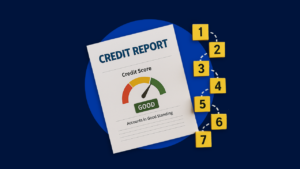Who is responsible for debt after divorce?

Key takeaways
- A divorce decree outlines which spouse is legally responsible for each debt after the divorce is completed.
- States either have community property or common law marriages, and these laws determine how marital debt is split after divorce.
- The divorce settlement agreement doesn’t override your legal obligation to a creditor if you jointly took out the loan with your spouse.
- You may have to take extra legal action in court to force an ex-spouse to pay for debts assigned as part of the divorce settlement.
Divorce may dissolve a marriage, but it doesn’t dissolve your responsibility to repay creditors for debt taken on during the marriage. This means you’re still legally liable for any joint debt you took out with a former spouse, including personal loans, credit cards, auto loans and mortgages — even if your divorce decree says the other person is responsible.
A divorce decree gives you extra legal protection to force an ex-spouse to pay joint debts assigned as part of the settlement, but it doesn’t override the original contractual agreement you signed with the creditor. Understanding the legal framework of divorce in your state can help you protect yourself from unexpected collection actions that could result in financial harm to you and your family.
Creditors can still report late payments on any joint credit account if your ex-spouse misses a payment. The only way to prevent this is to have joint debts refinanced into the ex-spouse’s name.
How debts are handled in a divorce
Allocation of debt responsibility in divorce largely depends on the type of debt and the state’s laws governing asset division. States either use common law or community property laws, and debts are typically categorized into marital debt or separate debt.
- Marital debt includes any financial obligations incurred during the marriage, regardless of whose name is on the account or who made the purchases.
- Separate debt refers to debts incurred before the marriage or after the separation, and these generally remain the responsibility of the spouse who took them on.
In community property states, marital debt is usually split between both spouses because it is considered jointly owned. In equitable distribution states, courts aim to divide debt in a fair but not necessarily equal way. This process involves considering factors like each spouse’s income, financial situation and future earning capacity.
In some cases, one spouse may be assigned a larger share of the debt to balance out an unequal division of assets or as compensation for financial misconduct during the marriage, such as excessive spending or gambling. Understanding these distinctions is crucial when negotiating or litigating financial settlements during a divorce.
Common law states
In common law states, debt typically belongs to the spouse whose name is on the account. It is not considered jointly owned unless both spouses signed for it. However, courts still aim to divide marital debts equitably, so even in common law states, a spouse could end up responsible for part of the other spouse’s debt if it benefited the household or was incurred for family purposes.
During a divorce, the amount you pay is subject to negotiation between you and your spouse or between you and your spouse’s attorney. It is typically divided based on negotiation and current or future income.
Community property states
Community property states view almost all assets and debts acquired during the marriage as jointly owned, regardless of who signed the contract or took out the loan. Debt is evenly split between both spouses, but responsibility for the debts can be negotiated in divorce court.
One important note: Creditors have the right to pursue any jointly owned property to collect on debt in a community property state, even if your name isn’t on the credit agreement. Don’t ignore collection notices, even if they come from creditors tied to your ex-spouse’s accounts.
If you try to get a government-backed mortgage, your ex-spouse’s debt may still be counted against you. Lenders may also require proof of payments made by your ex-spouse as proof you no longer own the debt.
Responsibilities by type of debt
Courts consider factors like whose name is on the debt, whether it was used for family or personal expenses and state laws when determining who should be responsible for repayment. However, a divorce decree doesn’t void the agreement you made to repay jointly owned marital debt. The decree only creates a legal obligation for your spouse to make the payments based on a court order. If your spouse doesn’t make the payments, creditors can — and often will — report late payments and start collection activities against you.
Credit cards
If you signed on the dotted line for a credit card, you’re still responsible for the balance and payments regardless of what your divorce decree states. If the card was used for normal household and shared expenses, the court will likely look at it as marital debt.
In some cases, if one spouse used the credit card for personal purchases or reckless spending, they may be solely responsible for that portion of the debt. Ultimately, credit card companies will pursue repayment from both spouses, no matter what a court ruling says about which spouse is the responsible party.
Mortgages
During divorce, mortgages are often treated similarly — if both spouses’ names are on the home loan, they may both remain liable for the mortgage unless the house is sold or one party refinances. Keep a close eye on this, especially if you’re awarded the property but your ex-spouse is responsible for payments.
Since you’re still legally responsible for the payments, any missed payments could result in you losing the home to foreclosure, even if your ex-spouse was supposed to make the payments.
Student loans
In many cases, student loans are considered personal obligations. However, the division can depend on whether they were incurred during the marriage and for whose benefit. That said, the repayment obligation is tied to whoever signed for the loan, so if you co-signed to help a spouse finish college, you’re legally responsible for the payments.
How to separate assets and debts in a divorce
Separating assets and debts in a divorce can be one of the most complex and contentious parts of the process. To reach a fair division of ownership and responsibility, it’s essential to determine which assets and debts are marital and which are separate. Your list may include:
- Real estate and related mortgages.
- Motor vehicles and related loans.
- Credit cards, personal loans and any other types of unsecured debt.
- Retirement accounts.
- Checking and savings accounts.
- Personal property.
- Copies of financial documents.
Once these categories are established, the next step is negotiating or litigating an equitable distribution based on each spouse’s contributions, future earning potential and financial needs. You may also need to consider jointly owned assets like homes or vehicles, as well as retirement accounts and pensions. In some cases, both parties may agree to divide assets and debts through negotiation or mediation, allowing for more control over the outcome.
If the spouses cannot reach an agreement, the court will step in and distribute the assets based on state laws — either according to community property rules or equitable distribution principles. Taking the time to separate and evaluate assets and debts carefully ensures a fair resolution that accounts for each party’s financial situation post-divorce.
After, keep track of your credit score and watch for alerts about late payments, debt collections or anything else that might indicate your ex-spouse isn’t honoring the debt repayment obligations laid out in your divorce decree. It’s easier to recover from one 30-day late payment than several collections, a repossession or a foreclosure.
How timing affects responsibility for debt in a divorce
The date and year you or your ex-spouse opened your collective credit accounts is crucial in determining which debts are assigned to whom. In general:
- Debts taken out during the marriage are considered marital debts. That makes you both potentially liable for repayment. It doesn’t usually matter who initiated the debt, who used it more or who benefited from it if it was originated while the couple was legally married.
- Debts incurred before or after marriage are classified as separate debts. A loan or credit card debt acquired by one spouse before marriage usually remains their sole responsibility, even after divorce. Similarly, debts incurred after the separation date but before divorce finalization may also be considered separate in some states, especially the family didn’t receive a financial benefit from the debt.
Bottom line
Ultimately, you and your ex-spouse are responsible to your creditors for any debt you take out in your names, whether individually or jointly while you’re married. Community property states give creditors extra collection power against any assets you acquired during marriage.
However, creditors can’t pursue you individually if you weren’t on the credit agreement. That means they can’t report late payments or collections on your credit report if you didn’t open the accounts together.
Frequently asked questions
Why we ask for feedback Your feedback helps us improve our content and services. It takes less than a minute to complete.
Your responses are anonymous and will only be used for improving our website.







